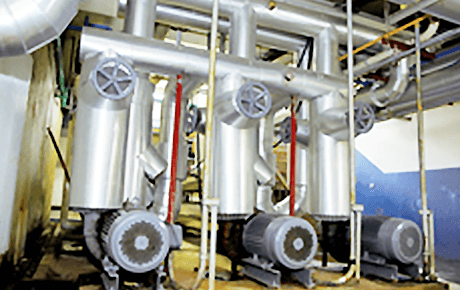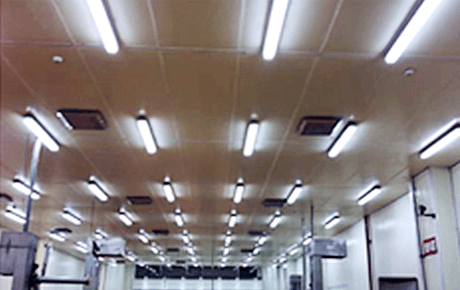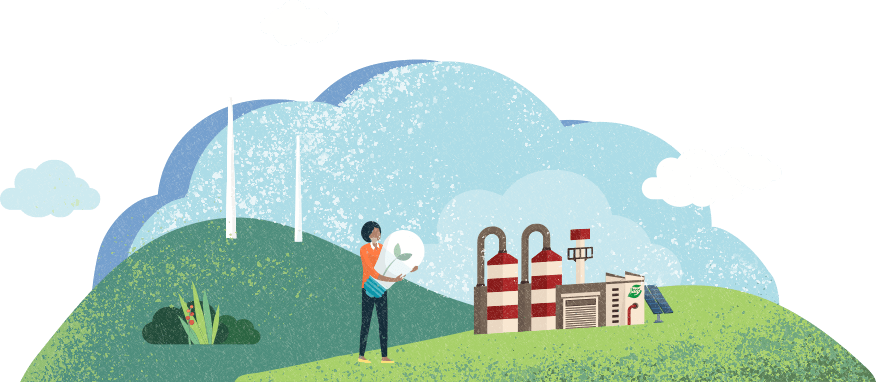Energy use intensity(EUI)(kj/NT$1)
Power use intensity(PUI)(kWh/NT$1,000)
GHG emissions intensity(ton CO2e/NT$1 million)
- First food company in Taiwan to receive Green Factory designation
- Carbon reduction: we have reduced GHG emission density year-by-year; having set 2016 as the base year, the Scope 1 GHG reductions in 2019 have reached 40.1% and overall emissions reductions by 8%, while carbon density has been reduced by 17.1%
- Energy conservation: we have reduced energy intensity and energy use intensity (EUI) year-by-year; cumulative energy savings in Dayuan Plant from 2016 to 2019 have reached 1.238 million kWh
- Power conservation: our airport channels received No. 3 in power and energy conservation and carbon reductions award from Taoyuan International Airport in 2019
- Renewable energies: Dayuan Plant has cumulatively generated 680,000 kWh of power and Qingshui service area's annual generation is 25,696 kWh
- Water conservation: by recycling and reusing cooling water, we have saved 12,015 tons of water consumption/year
- cular economy: we have promoted recycling and reusing food ingredients and hardware/materials and have cumulatively reused 3,000 wooden pallets and reduced 6,756 kg of meat from being wasted
ENVIRONMENTAL MANAGEMENT STRATEGYHsin Tung Yang's Environmental Management Strategies
The food and retail industries are strongly influenced by environmental and climate change, and in order to respond to multiple potential environmental challenges including fluctuations in raw material prices and volumes, unstable water supplies, and increased energy costs, Hsin Tung Yang has established and implemented green transformation strategies, and we are gradually establishing a greenhouse gases (GHG), energy, water resources, and waste management system and measures from Dayuan Plant, headquarters, to our channels. In addition, we have also been planning and promoting creative circular economy actions in our value chain. Hsin Tung Yang received the Green Building Label in 2017, and awarded the Clean Production certification in 2018. Furthermore, the same year, we are the first food company in Taiwan to be honored with the Green Factory certification. Looking forward, we will plan to gradually implement related management framework including carbon footprint and water footprint, and continue to advance in our energy conservation and carbon reduction actions, as well as collaborate with value chain partners to research and develop creative circular economy models in the hopes of becoming the leader in sustainable foods.
| Management aspec | Operating unit | Management strategy and objective | Action plan and measures | 2019 results/performance |
|---|---|---|---|---|
| GHG Management | Dayuan Plant | Setting 2016 emissions as the base year, we plan to reduce 50% of GHG emissions before 2030 | Carry out GHG inventories and promote annual energy conservation and carbon reduction plan | Reduced GHG emissions by 8% in 2019 compared with 2016 data |
| Airport channels | Join airport energy conservation and carbon reduction initiative | Participate in joint carbon reduction plan at Taoyuan and Kaohsiung International Airports and practice voluntary carbon reduction | Received No. 3 from power and energy conservation and carbon reductions award from Taoyuan International Airport in 2019 | |
| Energy Management | Dayuan Plant | Conserve 1% of power in each year beginning in 2015 | Implement energy inventories and establish action plan and to promote renewable energies |
|
| Airport channels | Join airport energy conservation and carbon reduction initiative | Join green lighting initiative at the airport and to promote energy conservation and carbon reduction | Replaced existing lights with LED lighting at Taoyuan Airport store in 2019, thereby saving 11,826 kWh of power | |
| Highway service area | Plan relevant measures in line with the unique features set up at each service area | Air conditioner and lighting control, venue heat source management and promotion of renewable energies | In 2019, Qingshui service area generated over 8,000 kWh of solar power | |
| Headquarters building | Enhance employees' awareness for energy conservation | Promote power conservation | Headquarters used approximately 23,461 kWh of power in 2019, showing a 3% decrease from 2017 | |
| Water resources management | Dayuan Plant | Reduce water consumption by 1% in each year | Digitize data on water use management, circular use of cooling water | Water consumption in 2019 was 93,242 tons, showing a 17% reduction from 2017 |
| Headquarters building | Enhance employees' awareness for water conservation | Promote water conservation | Water consumption in 2019 was 3,684 tons, showing a 3% reduction from 2017 | |
| Waste management | Dayuan Plant |
| Extend useful life of objects, reduce scraps and increase recycling rate | Recycling rate was approximately 71.2% in 2019 |
| Headquarters building | Enhance employees' awareness for recycling and reuse | Promote recycling | Recycling rate was approximately 24% in 2019 |
GREEN FACTORY PROMOTIONGreen Factory Promotions
Hsin Tung Yang has always held true to a spirit of continuous improvement. We have actively promoted green production measures, including energy and water conservation, waste reduction, and pollution prevention as well as clean production improvements including implementing green production processes since our Dayuan Plant was built in 1988.
Green Production Goal
- Environmental self-management at standards more rigorous than the minimum legal requirements.
- Promote clean production, source reduction and recycling and reuse
- Promote energy conservation and improvements
- Solve air pollution problems
- Receive certifications for Clean Production, Green Building, and Green Factory in Taiwan, becoming a benchmark in green production and management
- Promote greenhouse gas management and to be aligned with the government's green energy policy
- Establish and receive third-party assurance for energy management system
- Establish and receive third-party assurance for environmental management system
- Become aligned with international green product trends
- Digitize information on energy management
- Information disclosure on sustainability and fulfill corporate social responsibilities
Plant construction and adjustments
(1987~1992)
Production cycle
(1993~2016)
Pursuing Green Factory certification
(2017~2018)
Green Management System Implementation
(2018~2019)
Green Growth (Short, mid and long-term goals)
(2020~2025)
Action Plan/Measures
- Implemented the NIJHUIS wastewater treatment system from the Netherlands
- Building and air conditioner energy conservation: installed PU insulation panels at air conditioned processing areas and set up ice storage centralized air conditioning system
- Coordinated management over power equipment and installed public power system and central control room for the entire plant
- Implemented energy and resource self-management; established, statistics and analysis of energy management charts
- Promoted green processes compliant with the concept of green production, making processes more reasonable, energy-saving and more automated Properly managed commercial waste
- Implemented energy inventories system and formulated an Energy Inventories Team
- Stopped using heavy oils to heat boilers and opted for external purchase of steam gas
- Promoted and received Green Building certification; improved air conditioning and lighting systems
- Promoted and received Clean Production verification and certification
- First food company in Taiwan to receive Green Factory designation
- Promoted and received ISO 14064-1 Greenhouse Gas Inventory Standard
- Installed 283.2kW renewable energy (solar power) generation system, and annual green power generation can reach 350,000 kWh
- Promoted and received certification for ISO 50001 Energy Management System
- Promoted and received certification for ISO 14001 Environmental Management System
- Promote product carbon footprint and water footprint
- Establish energy management system (EMS) and promote manufacturing execution system (MES) along with IT department
- Promote disclosures in Corporate Social Responsibility Report
THE FIRST FOOD COMPANY TO OBTAIN THE "GREEN FACTORY MARK" CERTIFICATIONNo. 1 First Food Company in Taiwan to Receive Green Factory Designation
To stay on top of international environmental protection trends and to lead the food industry toward green production and sustainable management, Hsin Tung Yang began related promotions to achieve the Green Factory certification in 2016. No detail was spared from hardware equipment to software processes, and all staff worked diligently to achieve the dual inspections for the Ministry of Interior's "Green Building" label for factory building and the "Clean Production" evaluation system for production processes. Finally, we were awarded the "Green Factory" certification in 2018 by the Industrial Development Bureau, MOEA, thereby becoming the first food company in Taiwan to receive this honor.
Taiwan Green Building Label
Air conditioning improvements
Lighting system improvements
Clean Production assessment
Sustainable energy management
Sustainable water management
Green production
Pollutant management
Environmental-friendly product design
Sustainable supply chain and green procurement
First Green Factory certified food company
Green Building
Energy conservation, waste reduction & going green
Clean Production
Automated production and disinfection
Renewable Energy
Installed solar power generation panels
Recycling and Reuse
Recycling sludge from food processing
ENERGY-SAVING RENOVATION OF EXISTING BUILDINGSEnergy-saving Reform of Existing Buildings
Why can't old factory plants go green? Though we hold a long history, Hsin Tung Yang continues to pursue modern environmental protection awareness, and air conditioning and lighting system improvements were planned for the production facilities at Dayuan Plant in line with "Green Building Assessment Handbook - Reforming Older Buildings" from the Ministry of Interior. The improvements led to a carbon reduction benefit of 15.08%, and we received the Bronze-level Green Building Label from the Ministry of Interior in December 2017.


| System | Measure | Energy conservation (kwh/year) | Carbon reduction (ton CO2/year) |
|---|---|---|---|
| Air conditioning | Installed inverter control at existing pumps | 210,376 | 111.9 |
| Lighting system | Replaced high-energy consuming lights with energy-efficient lights | 622,009 | 330.9 |
| Total | 832,385 | 442.8 | |
IMPLEMENT CLEANER PRODUCTIONImplementing Clean Production
In terms of environmental impacts from production and operating processes, Hsin Tung Yang continues to implement improvements based on the six Clean Production aspects, which not only covers energy and resource conservation, green processes, pollutant management and end-of-pipe treatment technologies, but also includes eco-friendly design, green management, social responsibilities, and other clean production philosophies. After various qualitative and quantitative evaluations, Hsin Tung Yang achieved the "Compliance with Clean Production Evaluation System" certification from the Industrial Development Bureau, MOEA in January 2018.
Sustainable energy management
- Implement energy inventories and established an Energy Inventories Team to actively promote energy conservation and improvements.
- Replaced worn energy-consuming equipment to increase energy efficiency.
- Installed renewable energy (solar power) generation system. Implemented ISO 5001 Energy Management, ISO 14064-1 Greenhouse Gas Inventories, and ISO 14001 Environmental Management systems.
Pollutant management
- Various waste types are all properly treated based on principles of source management, reducing process waste and end-point control.
- Increased ratio of waste recycling, building a tracking mechanism for waste clearance and reuse.
- Implemented wastewater and sludge treatment and strengthened hazardous substance management system to properly treat hazardous substances.
Sustainable water management
- Proposed water resource management programs and promoted diverse water-saving measures by using consumptiong reduction, recycling, and reuse strategies.
- Conducted thorough water resource inventories and established a water use chart and water balance chart.
- Installed digital water grid to clearly understand the water consumption at each primary water pipe.
Environmental-friendly product design
- Based on the concept of product life cycle, we used environmentally-friendly product design concept to avoid over-packaging.
- Environmental awareness is included in the design phase of a product's life cycle to reduce environmental impacts throughout its life cycle.
Green production
- Optimized production processes and management measures to enhance productivity in food processing and production.
- Implemented Clean Production technologies and methods to maximize the effectiveness of resource consumption and to minimize negative environmental impacts.
Sustainable Supply Chain and Green Procurement
- We have established a sustainable supply chain management system and included environmental sustainability into the supplier screening mechanism. In addition, we also confirm that materials selection of products are environmentally-friendly to reduce the harm to the environment or to human bodies.
- Promoted Green Procurement, and purchases are predominantly products with Green Mark, Energy Label, FSC, RSPO seal, and Green Building Label.
GREEN FACTORY VISITS AND EXCHANGESGreen Factory Visits and Interactions
Our enriched Green Factory designation and performance have set benchmarks for governmental and school visits, thereby creating external benefits. From 2017 to 2019, we have received visiting groups from the Industrial Development Bureau, MOEA; the Department of Economic Development, Taoyuan, and Importers and Exporters Association of Taipei. In addition, we have also received 573 visiting students and faculty from 19 related food and fowl and livestock health care departments from domestic and overseas colleges and universities, and were invited to attend seminars and forums organized by the Bureau of Energy, MOEA; Industrial Development Bureau, MOEA; and to share our experiences with energy and water conservation and renewable energy promotions throughout Taiwan. Cumulatively, we have influenced approximately 560 persons spanning food, dining and beverage, biotechnology, chemical engineering, technology, spinning and textile, paper-making, and rubber industries.
Protecting the Nature
Adopting Green Energy to Ensure Environmental Sustainability



